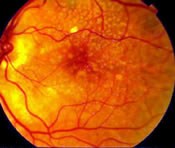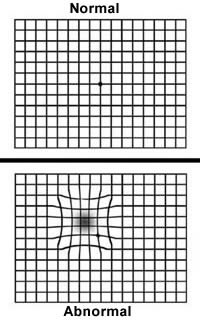
Age-related macular degeneration is the most common cause of impaired reading in the United States for people 50 or older. This disease can be associated with central vision loss or the loss of the ability to read, drive, or see objects up-close. There is a thin layer of tissue that holds vision cells in the back of the eye and it is a part of the retina. The retina acts like a film inside of a camera and the macula is the central focus point of the retina. The macula helps us read and see details up-close. If the macula is damaged, it can cause central vision loss but hasn’t been known to cause total blindness. Macular degeneration has many different forms and not all of them are severe. Some people who have macular degeneration still have 20/20 vision and do not have symptoms but this disease will most likely cause a need for reading glasses and in minority of people, will cause central vision loss. Macular degeneration screening is imperative to determine the right Macular degeneration treatments.

Macular degeneration is a disease that typically affects both eyes, one usually worse than the other. The Retinal Pigment Epithelium (RPE) is the primary tissue affected with this disorder with secondary degenerative effects upon the overlying retina and underlying choroidal vessels. As a result, central vision deteriorates sometimes with profound effects. Most patients who have macular degeneration fear that they will become blind but fortunately the disease does not affect peripheral vision so total blindness will not occur.
There are two major types of age related macular degeneration and this includes the dry type and the wet type. The dry type of AMD is the most common form and affects 90% of patients. Most of the time, patients suffering from dry type AMD will need more light to read and will have difficulty adjusting to different levels of light conditions. Sometimes a patient with dry type AMD will experience a blurring of vision. The symptoms will mostly affect daily tasks such as reading or driving The wet type is the form that is mostly responsible for central vision loss. The wet type causes bleeding and leakage in the macula and this is due to abnormal growth of blood vessels, called choroidal neovascularization. This can cause central vision loss, and distortion and blurring of vision.It is important to check both eyes to see if you are noticing a difference in vision. Some patients may see flickering lights which can be caused by chronic leakage.
There are many things that can contribute to the causes of macular degeneration including smoking, obesity, race, family history, and gender. If you have macular degeneration in your family history you will have a higher risk for AMD. The disease tends to be a greater risk to women than men, and Caucasians are more likely to lose vision from AMD then African Americans.
A comprehensive eye exam including macular degeneration screening will help determine if you are suffering from age related macular degeneration. Call the Kaufman Eye Institute today to schedule an appointment. We will help you determine what the next step will be in protecting your sight.
Macular degeneration treatment is available. Dr. Kaufman and the physicians of Kaufman Eye Institute will discuss the macular degeneration treatment option that is best for you.
Causes of Macular Degeneration
- Smoking: Smoking increases the risk of AMD.
- Obesity: Research studies suggest a link between obesity and the progression of early and intermediate stage AMD to advanced AMD.
- Race: Whites are much more likely to lose vision from AMD than African Americans.
- Family history: Those with immediate family members who have AMD are at a higher risk of developing the disease.
- Gender: Women appear to be at greater risk than men.
Can My Lifestyle Make a Difference?
Your lifestyle can play a role in reducing your risk of developing AMD.
- Eat a healthy diet high in green leafy vegetables and fish.
- Don't smoke.
- Maintain normal blood pressure.
- Watch your weight.
- Exercise.
Signs and Symptoms
- Loss of central vision.
- This is usually gradual for patients with dry macular degeneration. Patients with the wet type may experience a sudden decrease of central vision.
- Distorted vision.
- Straight lines may appear wavy or bent. Click here to download an Amsler Grid to do a self test
- Difficulty reading or seeing details.
If you have any questions about Macular Degeneration or your Macular Degeneration treatment options, please contact us at one of the Kaufman Eye Institute locations, serving the communities of Zephyrhills/Dade City, Sun City Center/South Shore, Bushnell/Floral City & Wesley Chapel/Land 'O Lakes/New Tampa/Lutz.




